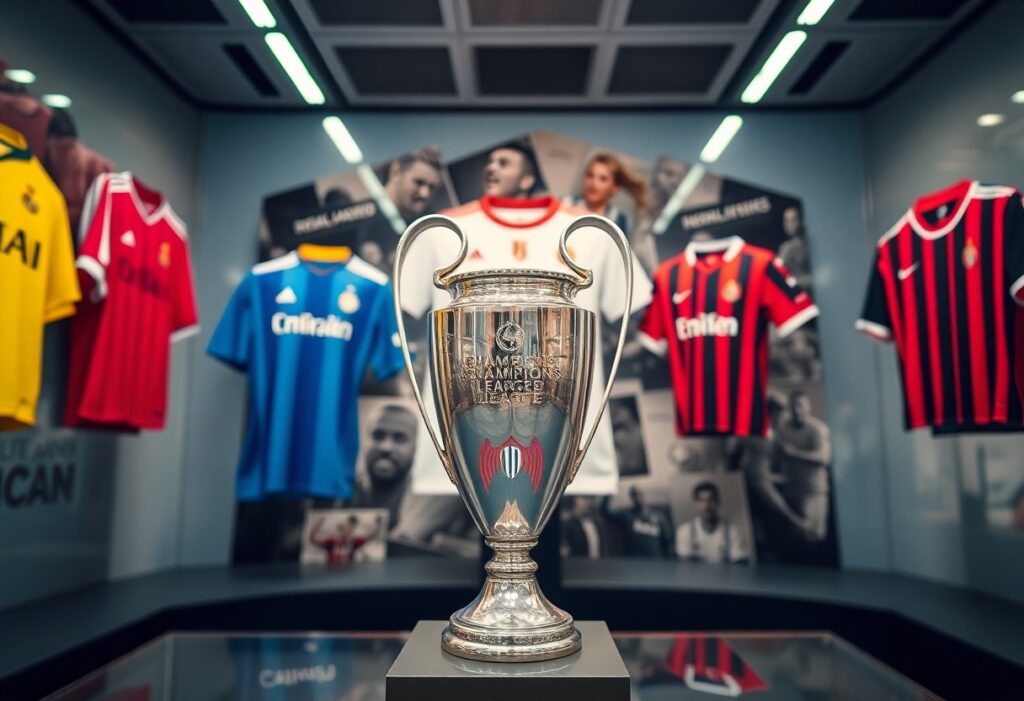
Over the years, the UEFA Champions League has showcased some of the world’s most prestigious football clubs, each leaving a lasting legacy through their performances. Clubs like Real Madrid, AC Milan, and Liverpool have dominated the competition, amassing a remarkable number of titles that underline their excellence on the international stage. This post examines the most successful teams in Champions League history, highlighting their key strategies, iconic players, and the passion that propelled them to greatness.
Criteria for Success in the Champions League
Success in the Champions League hinges on various factors, including historical performance, financial backing, and managerial excellence. Clubs that consistently reach the later stages demonstrate a blend of tactical prowess, a rich tradition in the tournament, and the ability to attract top talent.
Historical Performance Metrics
Clubs with a strong track record in the Champions League often capitalize on their past successes. Winning multiple titles boosts a team’s confidence and attracts seasoned players who are familiar with the pressures of knockout football. For instance, Real Madrid’s 14 titles highlight their enduring ability to perform in high-stakes matches.
Financial Investment and Management
Top-performing clubs benefit from substantial financial resources, enabling them to sign elite players and coaches. Investment in infrastructure, such as training facilities and scouting networks, also plays a significant role. Manchester City’s emphasis on financial strategy post-ownership takeover illustrates how targeted funding can elevate a club’s competitive edge.
Financial management not only influences player acquisitions but also ensures sustainable growth. Successful clubs prioritize long-term financial health, often investing in youth academies and integrating homegrown talent into their squads. Bayern Munich exemplifies this approach, balancing marquee signings with a strong commitment to developing young prospects, ensuring continuity and competitiveness in the Champions League over the years. Their strategy often results in both immediate success and future stability, making them perennial contenders.
Top Clubs Overview
Several clubs have consistently proven their mettle in the UEFA Champions League, showcasing remarkable talent, tactical brilliance, and financial acumen. Through impressive performances, historic rivalries, and strategic investments, teams like Real Madrid and AC Milan have carved their names into the annals of football history, setting standards for both achievement and legacy.
Real Madrid: The Undisputed Kings
With a staggering 14 Champions League titles, Real Madrid remains the most successful club in the competition’s history. Their dominance is underscored by players like Pele, , and numerous legendary managers who’ve crafted iconic moments and tactical innovations that have defined eras in football.
AC Milan: A Legacy of Excellence
AC Milan, with seven Champions League victories, has established a rich legacy blending style and substance. Their tactical prowess, particularly under managers like Arrigo Sacchi and Carlo Ancelotti, coupled with a roster filled with legends such as Paolo Maldini and Marco Van Basten, contributed to unforgettable triumphs, including the remarkable 2007 final against Liverpool.
Tactical Innovations That Made a Difference
Clubs that have dominated the Champions League often owe their success to adopting innovative tactical approaches. From Barcelona’s famed possession-based play, termed “tiki-taka,” to Liverpool’s high pressing under Jürgen Klopp, these tactical shifts not only maximize player strengths but also disrupt opponents’ strategies. Formation evolution, like the switch between 4-2-3-1 and 4-3-3, has enabled teams to react dynamically to different challenges, making tactics a vital element in their quest for glory.
Coaching Philosophies
Visionary coaches have transformed clubs into Champions League contenders through distinct philosophies. Pep Guardiola’s emphasis on fluidity and positional play has reshaped Manchester City, while Zinedine Zidane’s blend of tactical flexibility and player motivation has led Real Madrid to four titles in five years. These coaching styles create environments that foster not only winning but also engaging, aesthetically pleasing football.
Player Development and Recruitment
Success in the Champions League heavily relies on effective player development and recruitment strategies. Clubs like Ajax and Bayern Munich have consistently prioritized youth academies, producing homegrown talent who understand the club’s philosophy. Simultaneously, strategic signings—such as Chelsea’s acquisition of N’Golo Kanté—have bolstered team dynamics, creating a powerful blend of experience and youthful exuberance that thrives on the European stage.
For instance, Ajax’s famed youth academy has produced stars like Matthijs de Ligt and Frenkie de Jong, demonstrating a commitment to not only developing skills but also the tactical intelligence necessary for high-stakes matches. This approach maximizes long-term sustainability, with clubs often investing in young talent to build a strong future rather than relying solely on high-profile signings. These developments create robust squads capable of competing at the highest level for years.
Influence of Support and Fan Base
Strong support and an engaged fan base have undeniably shaped the fortunes of successful clubs in the Champions League. The synergy between teams and their supporters turns matches into electrifying experiences that can lift players’ performances, creating an environment where confidence flourishes. Clubs like Liverpool and Borussia Dortmund exemplify how passionate fan bases can intimidate opponents, often leading to key victories that contribute to their historical successes.
Home Advantage and Atmosphere
The atmosphere generated by home fans significantly impacts Champions League outcomes. Stadiums like Anfield and Signal Iduna Park become fortresses for their teams, with roaring crowds creating an unsettling environment for visiting sides. This home advantage can dramatically influence match results, enabling clubs to perform at their best under pressure.
Global Fan Engagement
Successful clubs actively cultivate global fan engagement, strengthening their brand and generating revenue. By leveraging social media platforms and establishing international fan clubs, they create a sense of belonging amongst supporters worldwide. This engagement drives viewing numbers and merchandise sales, further enabling clubs to invest in talent and facilities.
For instance, Manchester United boasts over 1.1 billion followers globally, illustrating the power of a well-executed engagement strategy. They conduct pre-season tours in various countries, meeting local fans and expanding their reach. Similarly, Real Madrid and Barcelona have utilized digital platforms to engage millions, allowing fans to interact with players and partake in unique experiences. This level of global connection not only elevates the club’s profile but also creates a vibrant, committed community that is imperative for sustained success in the Champions League.
Recent Trends in Champions League Success
In recent years, the Champions League has witnessed shifting dynamics, with traditional powerhouses facing increasing competition from emerging teams. The financial disparities among clubs have lessened, allowing for a more unpredictable tournament where outsiders can challenge established elite teams. This evolution highlights a strategic adaptation, wherein clubs prioritize not just immediate success but also long-term development and financial sustainability.
Emergence of New Contenders
The rise of clubs like Manchester City and RB Leipzig signifies a shift in the Champions League narrative. With significant investment in infrastructure and talent development, these clubs have challenged the historical dominance of giants. Their achievements showcase a blend of tactical innovation and youth integration, making them formidable opponents in the tournament.
Impact of UEFA Regulations
UEFA regulations, particularly the Financial Fair Play (FFP)</strong) rules, have significantly influenced club strategies. By enforcing spending limits, clubs must balance investment with sustainable practices, forcing them to innovate rather than rely solely on financial muscle. This has led to a more competitive landscape, as teams find creative solutions to thrive within the constraints.
The implementation of Financial Fair Play (FFP) has reshaped Champions League participation since its introduction in 2011. Clubs previously known for lavish spending are now constrained to operate within defined budgets, promoting a focus on youth development and smart acquisitions. For instance, clubs like Atletico Madrid have built competitive squads through meticulous scouting and strategic player development instead of merely outspending rivals. This paradigm shift encourages not only financial accountability but also tactical diversity, as clubs become more resourceful in achieving success on the European stage.
Lessons from the Classics: Best Practices
Long-Term Planning and Stability
Successful clubs prioritize long-term vision over short-term gains. Teams like Real Madrid and AC Milan have established stability through consistent management, allowing for gradual player development and strategic recruitment. This stability fosters a strong club culture and resilience in challenging times, leading to sustained success in the Champions League.
Adaptability and Evolution in Strategy
Adaptability defines elite clubs, with many evolving tactics to meet new challenges. Barcelona’s transition from possession-based football to a more counter-attacking style under different managers illustrates this flexibility. Recognizing the need to adjust not only to opponents but also to the evolving landscape of football ensures longevity in their dominance.
Clubs that excel in the Champions League often embrace evolutionary strategies to remain competitive. For instance, Bayern Munich’s shift post-Guardiola saw them blend high pressing with a more pragmatic approach, enriching their tactical arsenal. This adaptability allows teams to outmaneuver rivals and maintain a competitive edge, crucial for thriving in knockout tournaments where unpredictability reigns. Such continuous re-evaluation and adjustment to both tactics and player roles highlight the importance of remaining dynamic in a rapidly changing game.
Conclusion
Presently, the most successful clubs in Champions League history exemplify a unique blend of consistent performance, tactical innovation, and the ability to attract top talent. Their achievements are rooted in strategic management, a strong club culture, and a commitment to excellence. These elements have not only secured numerous titles but have also solidified their legacies in European football. As the competition continues to evolve, these clubs remain benchmarks of success, showcasing the relentless pursuit of greatness in the sport.
FAQ
Q: Which club has the most Champions League titles in history?
A: Real Madrid holds the record for the most Champions League titles, with 14 victories. Their dominance is attributed to a combination of world-class talent, tactical flexibility, and a rich history in the competition, making them the most successful club in its history.
Q: What factors contribute to the success of clubs in the Champions League?
A: Success in the Champions League often stems from a strong squad depth, experienced players, strategic management, and consistency in performance. Clubs that can navigate both domestic and European competitions effectively tend to excel, as well as those with a strong home advantage and fan support during crucial matches.
Q: How does club history impact performance in the Champions League?
A: Clubs with a deep-rooted history in the Champions League often benefit from an established culture of winning. This historical success can build confidence, attract top talent, and facilitate a stronger mentality during high-pressure games, giving them an edge over less experienced competitors.



